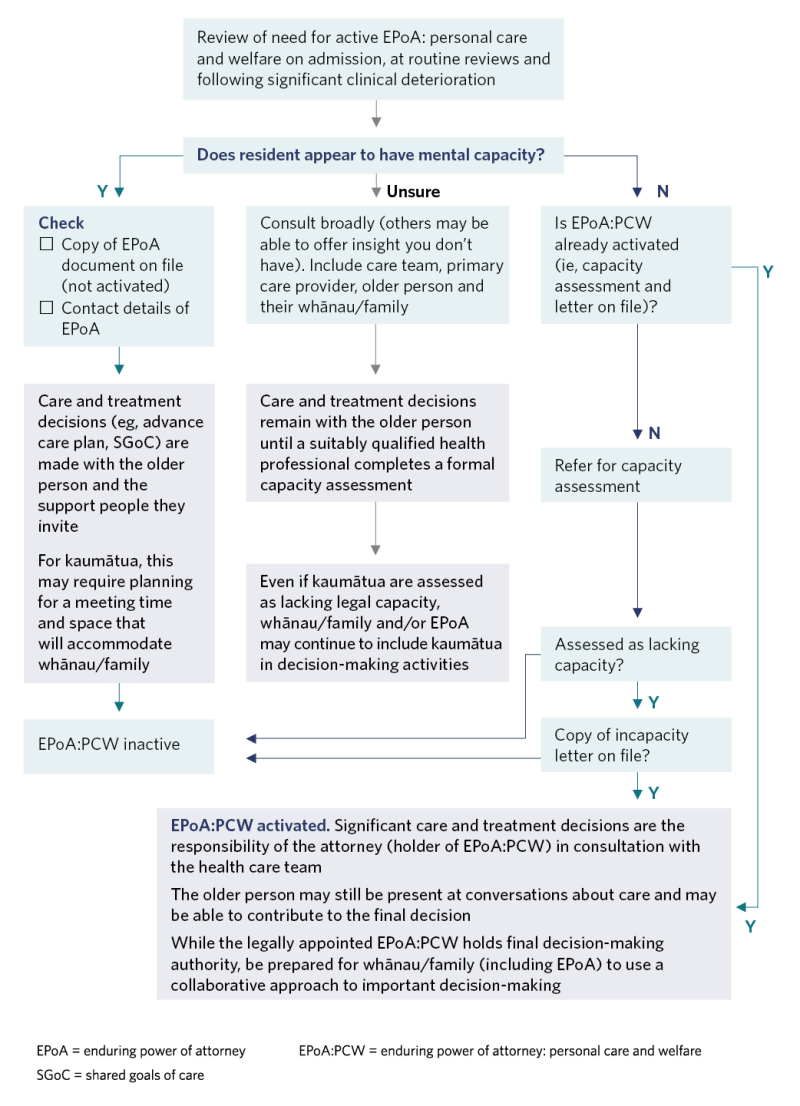Enduring power of attorney (EPoA) | Mana mauroa ā-rōia (Frailty care guides 2023)
To return to the list of all of the Frailty care guides | Ngā aratohu maimoa hauwarea, click here.
Contents
- Definition
- Why this is important
- Implications for kaumātua
- Assessment
- Care planning
- Further resources
- Decision support
- References | Ngā tohutoro
The information in this guide is accurate to the best of our knowledge as of June 2023.
Definition
An enduring power of attorney (EPoA) is the legal process of giving (donating) a trusted person (the attorney) the power to make decisions on your behalf under the Protection of Personal and Property Rights Regulations 2008. Decisions may be about (1) your property or (2) your personal care and welfare. Each type of decision is a separate authority.
- EPoA: property donates the power to make financial decisions. This can be set up for use when the donor has ‘capacity’ or when they lack ‘capacity’ (ie, it is the donor’s choice).
- EPoA: personal care and welfare donates the power to make health care decisions only if the donor lacks ‘capacity’ to make their own decisions.
Key points
- EPoA: personal care and welfare (PCW) is active only after a suitably qualified health professional assesses the person and certifies they are ‘mentally incapable’. Examples of a suitably qualified health professional are a general practitioner, nurse practitioner or medical consultant.
- The authority of the attorney to make personal care and welfare decisions can be challenged if the attorney fails to act in the donor’s best interest.
Why this is important
By being clear about the parameters of the EPoA:PCW, health professionals and attorneys can understand their respective roles in clinical decision-making.
Implications for kaumātua*
The collective nature of Māori culture may conflict with the underlying individualistic principles of EPoA legislation. This may mean there is some tension to navigate when working with the legislation and meeting the needs of kaumātua and their whānau/family. Establishing a clear EPoA communication plan for whānau/family will likely reduce tension in times of acute illness when it is especially important to include whānau/family.
Generally, an EPoA is established before a person is admitted to aged residential care. However, if it needs an update or review, kaumātua will likely require whānau/family support. By creating time and space for this support to happen, you can provide whānau/ family-focused holistic care.
*Kaumātua are individuals, and their connection with culture varies. This guide provides a starting point for a conversation about some key cultural concepts with kaumātua and their whānau/family. It is not an exhaustive list; nor does it apply to every person who identifies as Māori. It remains important to avoid assuming all concepts apply to everyone and to allow care to be person and whānau/family led.
Assessment
The registered nurse (RN) should make a referral for a capacity assessment when they reasonably suspect that the older person lacks mental capacity and that an alternative decision-maker is required.
A lack of mental capacity means the ‘inability to; understand the nature of the decision, foresee the consequences of decision making or effectively communicate a decision’ (Protection of Personal and Property Rights (Enduring Powers of Attorney Forms and Prescribed Information) Regulations 2008).
Key points
- People are assumed to have mental capacity until proven otherwise.
- The RN contributes to the capacity assessment by documenting the reasons they believe the person lacks capacity. Importantly, this includes decision-making capacity that the person has retained as well as decision-making capacity that they have lost.
- Consultation with whānau/family or loved ones with an insight into the person’s decision-making history may provide useful supporting or contextual information.
Care planning
An EPoA communication plan for whānau/family is an important part of the care planning process.
Further resources
This video explains how to conduct a capacity assessment: vimeo.com/uow/capacityassessment (Plesner et al 2016).
Decision support

View a higher resolution version of this image in the relevant guide.
References | Ngā tohutoro
Plesner E, Fergus L, Young G. 2016. Training video on capacity assessment. Wellington: University of Otago Wellington. URL: vimeo.com/uow/capacityassessment.
If you have feedback about the Frailty care guides | Ngā aratohu maimoa hauwarea, click here.
